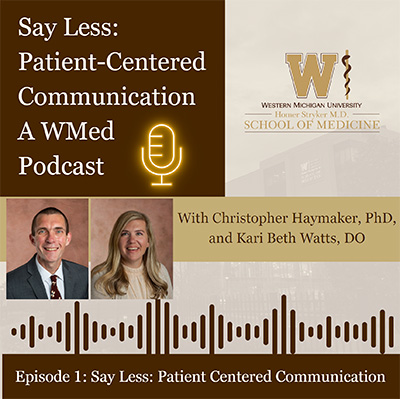
A new podcast launched by the Office of Continuing Education at Western Michigan University Homer Stryker M.D. School of Medicine (WMed) aims to help physicians and other healthcare providers from Southwest Michigan sharpen their communication skills and – in the process – provide better care and a better experience for their patients.
The first episode of “Say Less: Patient-Centered Communication, A WMed Podcast” was recorded in late July with hosts Christopher Haymaker, PhD, and Kari Beth Watts, DO.
MORE: Listen to Episode 1
“We landed on the name partly because – from our perspective – there are so many opportunities for listening deeply to patients and often one of the most important things you can do for patient communication is be a good listener,” said Dr. Haymaker, who serves as an associate professor in the departments of Medical Education and Family and Community Medicine at WMed. “There’s an art to crafting your questions so you can sit back and listen, and your patient can tell their story.”
The idea for the new podcast took root in late 2024 as the Office of CE was performing a comprehensive needs assessment as part of its annual accreditation process. That analysis, which included input from healthcare providers, as well as an extensive review of patient input on a community health needs assessment performed by Kalamazoo’s two hospitals, identified areas for improvement.
Specifically, the assessment showed that healthcare providers in Southwest Michigan provide care that is sufficient and clinically effective but there were gaps in communication and patient-centered practices and a need for more training to address the shortfall, said Nancy Bjorklund, EdD, MPA, assistant dean for Global and Continuing Education, and Kelsey Caras, data analyst in the Office of CE.
“Effective communication can help close the gaps in disparities in care and benefit the community as a whole,” Dr. Bjorklund said.
With information from the assessment and research in hand, Dr. Bjorklund and Caras set out this past spring to implement a new offering from the Office of CE to help clinicians strengthen their communication skills and work with their patients in a more collaborative way.
That work led them to Dr. Haymaker, a trained pediatric psychologist who specializes in physician-patient communication, who was excited to be part of the new podcast.
“The topic is something that’s in my wheelhouse,” Dr. Haymaker said. “I’ve always wanted to understand the perspectives of a wide array of humans. It is something that’s been a central part of what I do as a clinician and as a psychologist – seeking to understand someone else’s perspective and finding a way to deliver information to patients in a way that is going to make sense to them as our partners in communication.”
In the inaugural episode of the podcast, Drs. Haymaker and Watts discuss what patient-centered communication truly means in clinical settings, why it matters, and how to avoid common pitfalls. They also offer practical strategies for creating more meaningful and respectful interactions with patients.
For listeners, the podcast is eligible for CE credit. The first episode is 45 minutes long and provides 0.75 credits for physicians and psychologists. Future episodes may vary in length and credit amount but will not exceed 1.0 credit per podcast. Listeners are asked to complete an evaluation on the CE Portal after listening to an episode and the evaluation includes a spot for comments about what new things they learned and they can also suggest new ideas for future episodes.
Dr. Haymaker said the podcast gives clinicians and other providers the chance to learn and consume the knowledge and content in a format that, in some ways, can be more engaging than a traditional lecture.
“What’s appealing to me about a podcast is it’s ultimately unscripted and offers an opportunity to have a conversation that digs deeper into the way someone like Dr. Watts sees patient-centered communication.”
Moving forward, Caras, who produces the podcast, said the Office of CE plans to record and release new episodes at least quarterly. And, for his part, Dr. Haymaker has a running list of topics he wants to cover with guests, including how to start an effective interview with a patient; how to engage in shared decision making; how physicians can determine if a patient has a full understanding of what they have been told, and how to communicate under special circumstances.
“Patient-centered communication is universally good for everyone,” Dr. Haymaker said. “There’s not a physician or clinician out there that doesn’t have to engage in communication with patients and when you focus on mastering patient-centered communication, there are a lot of good things that happen. Communication gets easier and we are able to give much better, more efficient, and more effective care. It also helps fight burnout when you can engage in a way that fosters more compassion and more satisfaction in your day-to-day communications with patients because you feel more effective.”
Caras and Dr. Bjorklund said they are hopeful that the launch of the new podcast will give way to better communication between healthcare providers in the region and their patients. As part of the Office of CE’s commitment to a continuous cycle of improvement, Caras and Dr. Bjorklund will assess future community health needs assessments, as well as evaluations from podcast listeners, to see if the new offering is leading to an overall better experience for providers and patients.
“When it comes to communication, we want them to commit to making that change or that improvement and have that realization that patients are people and having empathy and being an active listener is what matters most to patients,” Dr. Bjorklund said.
